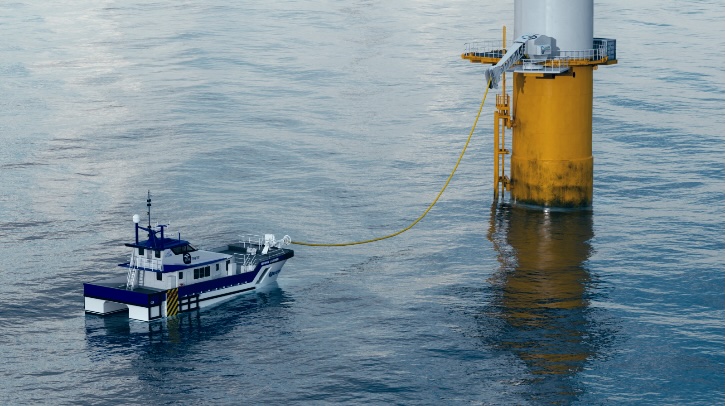Charge Offshore, a spinout of electrical power design company MJR Power & Automation, has completed charging system installation on what it claims is the world’s first diesel-to-electric retrofit crew transfer vessel (CTV).
Supported by funding from the Zero Emissions Vessel and Infrastructure (ZEVI) competition, e-Ginny was designed to help accelerate the offshore wind industry’s transition to electrification.
The project’s mission is to transform a diesel-powered CTV to run on 100% battery-electric propulsion, offering essential, low-carbon operations and maintenance support for offshore wind farms in the UK.
A key pillar was the development of scalable offshore charging solutions that enable electric and hybrid vessels to operate at sea without the need to return shoreside to charge.
The venture combines MJR’s experience in electrical marine systems with the expertise of software engineering from Elsys, mechanical engineering from Blackfish and low-carbon technological innovation from Tidal Transit.
As the vessel prepares for sea trials in October 2025, Charge Offshore says it has successfully delivered and installed the connector ‘catcher’ for its Aquarius Eco charging system, designed to deliver emissions-free power from offshore wind generation.
The connector deployment system will then be installed on a selected fixed offshore structure in the North Sea, providing safe, fast and reliable charging for e-Ginny during her charter.
Paul Cairns, CEO of Charge Offshore, commented, “Robust offshore charging infrastructure is critical to support the industry as it ramps up the transition to electrification. This landmark e-Ginny project demonstrates that, with the right systems in place, we can finally eliminate reliance on fossil fuels and unlock a new sustainable future for offshore wind operations.
“We’re proud to be at the forefront of maritime electrification and look forward to working further with Tidal Transit and our key technology partners to help accelerate the industry’s transition toward a new era of decarbonization.”
The e-Ginny project was part-funded by the UK government through the UK Shipping Office for Reducing Emissions (UK SHORE) program in the Department for Transport.
UK SHORE has allocated over £200m (US$273m) since 2022 to develop the technologies necessary to decarbonize the UK maritime sector and capture the economic growth opportunity of the transition.
In the Electric & Hybrid Marine Awards 2024, the prize for Environmental Achievement of the Year – Propulsion System Design was won by Tidal Transit for the e-Ginny CTV project. Find out what commercial director Leo Hambro and director Adam Wright had to say about winning the award in this video interview, recorded after the trophy presentation at Electric & Hybrid Marine Expo Europe 2024 in Amsterdam.



